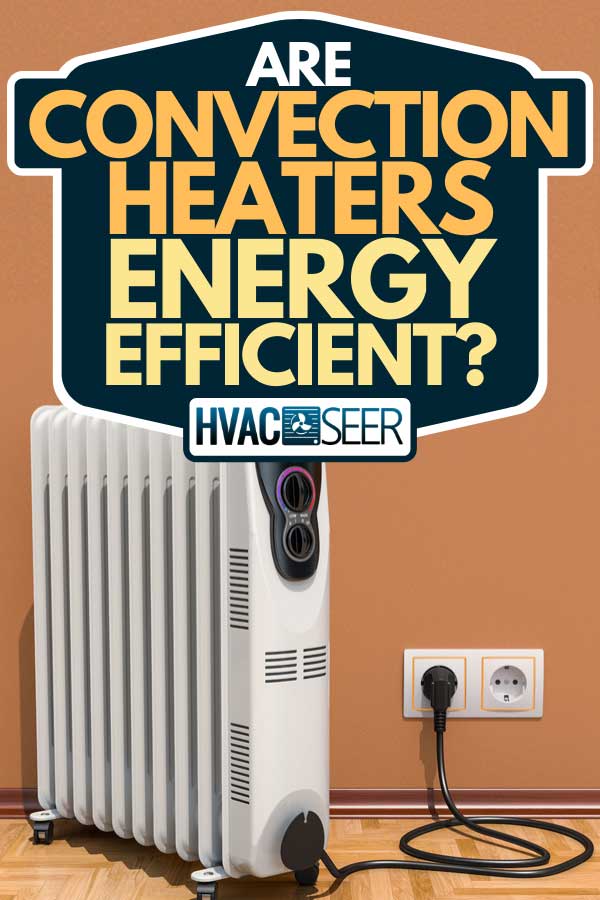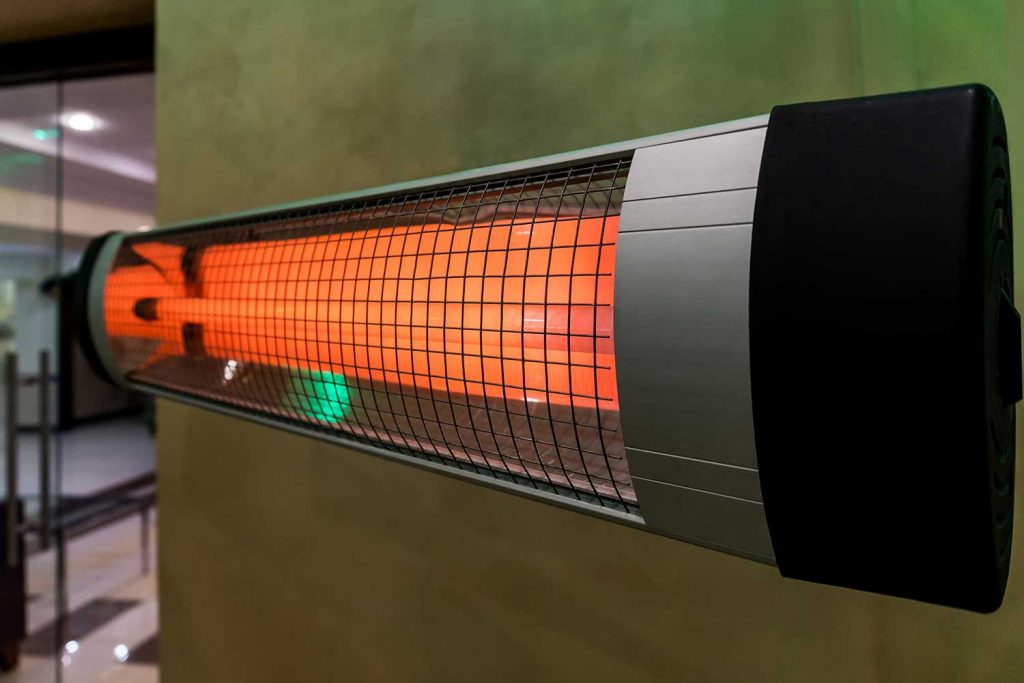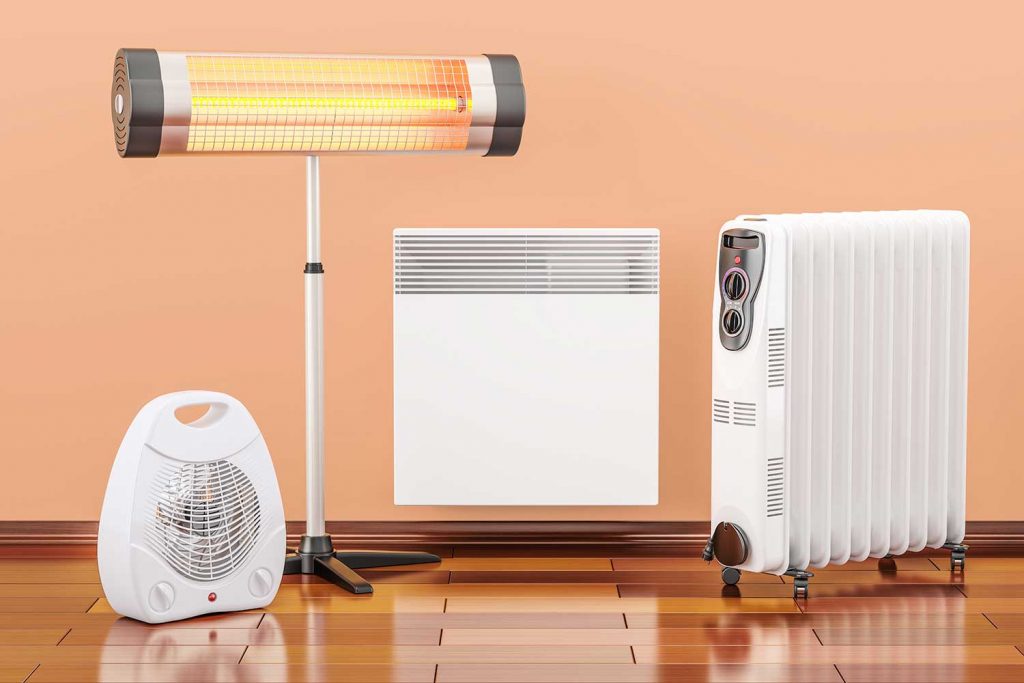Living in an area that experiences cold winters can make you more than a little familiar with the most common ways to keep your home warm during the winter months. Convection heaters (aka "space heaters") are commonplace in many households during these months, but are they efficient when it comes to energy costs? We've researched how convection heaters work to get the answer for you.
Convection heaters are energy efficient when used in a small space capacity. They are not particularly energy efficient when used to heat large spaces or an entire home.
There can be circumstances where convection heaters will be the most energy-efficient option for providing heat. However, there will also be conditions in which they will not be ideal for minimizing energy costs in the winter. Please keep reading as we discuss how convection heaters operate and how to make the most of your unit.

Maximizing the Energy Efficiency of Convection Heaters

Typically, the central heating system in a modern home will be more energy-efficient than any portable convection heater. However, if your home is not set up for a central heating system, convection heaters may be a great alternative. For the most part, convection heaters are used to supplement central heating systems when there are specific temperature preferences for certain spaces in a home.
Most efficient convection heaters draw about 1,500 watts for every second that they're in operation. Although some convection heaters use less energy and may draw as little as 400-550 watts of electricity. Convection heaters simply aren't that effective at heating larger areas in a home, as they rely on the air within a room to gradually disperse. This is not ideal for large homes or large spaces in a home as the heater will not provide a sufficient amount of heat compared to a forced-air heating system.
Electricity, for the most part, is still more expensive than natural gas in most areas. Placing a convection heater in every room of your home to match the temperature that a central heating system can provide will result in a high electric bill, as the heaters will have to run constantly.
To lower your electric bill low when using a convection heater, it's best only to use it to heat one or two rooms in your home. The other areas of your home may be cooler, but if these areas are typically unoccupied, there is no need to spend money to heat the entire home. However, it is best to turn down the thermostat to save on energy cost, as keeping the temperature higher while utilizing convection heaters can cause your energy bills to skyrocket.
How Does A Convection Heater Heat A Room?
Convection heaters come in two main categories, with or without a fan. They utilize elements including either ceramic plates or electric coils to distribute a convection heat current. As the element heats up, it causes the air around it to warm up as well. This warm air continues to circulate evenly inside a room, raising the temperature. Convection heaters that contain fans are actually able to circulate air faster and work best for larger spaces.
Check out this ceramic convection heater on Amazon.
Can I Leave A Convection Heater On Overnight?

No, it is recommended that you not leave a convection heater on overnight. These types of heaters can be very hazardous and dangerous if not used with caution. The reason for this is that the heating element on them is exposed, meaning that they have a greater susceptibility to cause fires, especially when they are left close to a flammable object.
As a matter of fact, approximately 25,000 home fires a year are caused by these types of heaters, according to the US Consumer Product Safety Commission. For additional information on operating heating systems overnight, please read, "Should I Turn Down Radiant Heat At Night?"
Common precautions when using convection heaters
- Have fire and smoke detectors installed in areas where convection heaters will be used. Also, look for heaters that have an automatic shut-off sensor when the unit becomes too hot.
- Avoid plugging the heater into an extension cord or power strip.
- Never leave a space heater unattended or in a room with an unattended child.
- Be sure to keep items such as curtains and furniture at least three feet away from the heater, as a system malfunction or short-circuiting can lead to a fire.
- Flammable objects such as combustible liquids, rugs, or plastics should be kept as far away from the space heater as possible.
It's also important to note that some older homes or apartment buildings may be ill-equipped to handle these types of heaters, as they can potentially cause electrical breakers to flip. It's always best to read the safety manual before operating a new convection heater.
Are Convection Heaters Noisy?
Convection heaters that come with built-in fans tend to be louder than non-fan heater models. And usually, the higher the temperature setting on your heater, the louder it will become. Non-fan models typically produce a light "humming" noise generated from the alteration current flowing through the electrical transformer's coils, which has an iron core. The core's expansion and contraction produce a light buzzing sound, which may be louder on less expensive heater models.
What Type Of Heater Is Most Energy Efficient?
Before determining which type of heater will be the most energy-efficient option for your home, it helps to know the specific purpose that it will serve.
warming an entire room for a few hours
In this case, a convection heater is best. Convection heaters are ideal when you're looking to temporarily warm up a room instead of short or extended periods of time. The heater will naturally circulate the air evenly around the room, and you can easily control the temperature with its thermostat and timer (most come with these options). This will help you save money and avoid overheating the room.
warming a room for a short period of time
When the goal is to get a quick blast of heat, radiant heaters are the best option. These heaters work quickly and are very useful if you are looking only to warm up a small area for a short period. Radiant heaters operate directionally, unlike convection heaters. Meaning they will not achieve the same evenness of heat when it comes to warmth in a room, making them less ideal for longer occupancy periods. Also, these heaters typically don't come equipped with timers are thermostats, making their energy consumption more expensive during long periods of use.
Let's look at a few other types of energy-efficient heaters.
Panel Heaters
Panel heaters are a good heating option to control the temperature in a specific room of your home or office. They tend to heat gradually and are typically wall-mounted and located near a power socket. Their design is slim and sleek, which is why they're also known for their great aesthetic value. Panel heaters are easy to program and have straight-forward temperature control options.
Ceramic Heaters
These little convection heaters are known for their convenience. Once ceramic are heaters plugged into a power source, they begin to heat up almost immediately. Their small, compact design makes them easy to move from one room to another or use in an office setting. If you're looking for something conveniently portable, this may be the perfect fit for your heating needs.
Infrared Heaters
Infrared heaters use soft metals, including quartz or copper, to conduct directional electricity in small spaces. The bulbs inside of infrared heaters are designed to last between 5,000 to 7,000 hours of use. They're another great option if you plan to only heat a specific area in a room or space.
Oil-Filled Radiant Heaters
This type of radiant heater has wider fins, which allow for a higher level of heat distribution through the oil that they contain. When they switch off, their metal surface (which contains the oil) continues to radiate heat without requiring any additional energy.
Check out hits oil-filled radiant heater on Amazon.
What To Consider Before Purchaing A Convection Heater
There are two important factors to consider before purchasing a convection heater for your home. Let's take a look at them.
1. The amount of heat that you need
Before purchasing a new convection heater, assess your home's heating needs. Doing so will help you determine what's best for your specific living preferences. Most space heaters will come with a rating that illustrates the size or approximate square footage of the space that it is ideal for.
If your heater is too small for the room that it's warming up, it will need to work overtime just to warm up the room, resulting in more energy used and a higher electric bill. A good rule of thumb is that you'll need about 10 watts for every square inch of floor space.
2. Your potential energy costs
To get a ballpark look at how much your convection heater may cost to run, take a look at your most recent electric bill and note the amount you pay for electricity per each "kilowatt-hour." The price will vary based on your state and locale. Next, consider the approximate number of hours a day that the heater is used, then convert this to kilowatts per hour (kWh). To do this, simply divide the heater's wattage by 1,000.
For example, if you pay $0.15 per kWh for electricity, and the wattage on your heater is 1,500, running the unit for 24-hours a day will result in energy costs of $5.40.
Wrapping things Up
Hopefully, this guide has taught you a bit more about convection heaters and how they work. Convection heaters are a great alternative when heating small spaces or just a few rooms in a home. However, for larger spaces or entire homes, central heating systems will be more energy efficient.
Before you go, be sure to check out some of our other HVAC-related posts:


